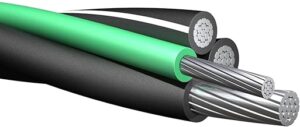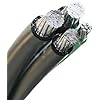When it comes to powering your mobile home, the feeder cable plays a crucial role. Ensuring a reliable and efficient power supply is essential for your comfort and safety. Whether you’re upgrading or installing a new system, choosing the right feeder cable can make all the difference. From providing adequate power distribution to enhancing overall performance, the quality of your cable matters. In this article Mobile Home Feeder Cable Power we will discuss all these options.
Investing in a high-quality feeder cable can prevent issues like power outages and electrical hazards, offering peace of mind and convenience. With the right choice, you can enjoy uninterrupted power supply without compromising on safety. Stay tuned as we explore the significance of selecting the ideal feeder cable for your mobile home setup.
Key Takeaways
Understanding the purpose of feeder cables is crucial for efficient power distribution in mobile homes.
Consider the materials and voltage capacity of feeder cables to ensure safety and optimal performance.
Aluminum feeder cables offer specific features that make them suitable for mobile home applications.
When selecting feeder cables, prioritize compatibility with your mobile home’s electrical system for seamless integration.
Adhering to industry standards for cable selection guarantees reliability and compliance with safety regulations.
Follow guidance on the cable selection process to make informed decisions based on your mobile home’s power requirements.
Quit Hunting for the Correct Feeder Cable for Your Mobile Home. Most hardware stores don’t carry what you need. Order here and have it shipped directly to your doorstep.
Purpose of Feeder Cables
Primary Function
Feeder cables in mobile home connections carry electrical power from the main power source to the distribution panel inside the mobile home. They act as the lifeline for transmitting electricity throughout the dwelling.
Moreover, feeder cables are essential components that ensure a stable and reliable power supply, enabling various appliances and devices within the mobile home to function properly. By securely transporting electricity, these cables facilitate a safe and efficient energy flow within the living space.
Importance of Compliance
Compliance with the 2011 National Electrical Code is crucial when installing feeder cables in mobile homes. This code sets forth regulations and standards that aim to enhance electrical safety and prevent hazards related to wiring installations.
Adhering to the guidelines outlined in the National Electrical Code ensures that feeder cable installations meet industry standards, reducing the risk of electrical faults, fires, or other safety issues. It is imperative for individuals involved in mobile home electrical work to stay updated on these regulations to guarantee a secure electrical system.
Specific Requirements
When it comes to permanent wiring in mobile homes, utilizing Southwire® Type feeder cable is recommended. This type of cable is specifically designed for mobile home feeder applications, offering durability, flexibility, and reliable performance.
Southwire® Type mobile home feeder cable features high-quality materials and construction that meet stringent industry requirements. Its design ensures optimal conductivity and insulation properties, making it suitable for long-term use in mobile home electrical systems.
Read more on our article: Mobile Home Power Pole or Mobile Home Wiring: A Comprehensive Guide to Electrical Basics & Safety
Overview of Cable Construction
Conductor Materials
thwire® mobile home feeder cables feature aluminum conductors, known for their lightweight and cost-effective properties. These conductors ensure efficient power transmission within the cable.
Conductor Configurations
The cables are designed with multiple conductors, typically ranging from 2 to 4, based on the specific model. This configuration allows for various electrical connections within the mobile home setup.
Design Features
The neutral wire size in Southwire® feeder cables is standardized to match the current capacity requirements of most installations.
Ground wire size is determined based on safety standards to provide effective grounding and protection against electrical faults.
Importance of Outer Diameter and Weight
The outer diameter of the cable is crucial for fitting into conduit systems or other installation spaces without causing congestion.
The weight specifications play a vital role in ease of handling during installation procedures, reducing strain on installers.
Materials and Voltage Capacity
Materials
Southwire® mobile home feeder cables are constructed using high-quality conductors with durable insulation suitable for various environments. These cables are designed to withstand harsh conditions, including exposure to sunlight and different types of weather.
The insulation of these cables provides protection against abrasion and ensures long-term durability, making them ideal for both indoor and outdoor applications. The materials used in Southwire® feeder cables comply with industry standards for safety and performance.
Voltage Capacity
With a maximum operating temperature suitable for direct burial in earth at specific conductor temperatures, Southwire® mobile home feeder cables offer reliable performance in various settings. These cables are specifically engineered to handle the demands of mobile home electrical systems.
The voltage rating of 600 volts further enhances the versatility and usability of these feeder cables. This high voltage capacity allows for efficient power transmission while maintaining safety standards, making them a preferred choice for residential electrical installations.
Quit Hunting for the Correct Feeder Cable for Your Mobile Home. Most hardware stores don’t carry what you need. Order here and have it shipped directly to your doorstep.
Aluminum Feeder Cable Features
Distinctive Features
Alumaflex® Brand AA-8000 series aluminum alloy conductors are known for their durability and flexibility.
These cables are lightweight, making them easy to handle and install in various mobile home feeder applications.
Advantages of Aluminum Conductors
Cost-effective: Aluminum conductors are more affordable than copper, making them a budget-friendly choice.
Corrosion Resistance: They are resistant to corrosion, ensuring longevity and reliability in diverse environments.
High Ampacity: Aluminum conductors have high ampacity levels, allowing for efficient power transmission.
Construction Benefits
The construction of these cables eliminates the need for field marking as per the National Electrical Code (NEC).
This feature streamlines installation processes by removing the requirement for additional markings on the cable.
Essential Specifications for Feeder Cables
Conductor Size
When selecting feeder cables for mobile home connections, one crucial specification to consider is the conductor size. The size of the conductor determines the amount of current that can safely flow through the cable. Larger conductor sizes allow for higher amperage capacity, reducing the risk of overheating and ensuring optimal performance.
Number of Strands
Another important factor to keep in mind is the number of strands within the feeder cable. Multiple strands offer flexibility and durability compared to solid conductors. They are less prone to breakage due to bending or movement, making them ideal for mobile home installations where vibrations and shifting may occur.
Insulation Properties
Insulation properties play a significant role in ensuring the safety and longevity of feeder cables. The insulation material should be durable, resistant to environmental factors like moisture and heat, and compliant with industry standards for electrical installations. High-quality insulation minimizes the risk of short circuits and electrical hazards.
Ampacity Rating
Understanding the ampacity rating of feeder cables is essential for safe and efficient electrical connections in mobile homes. The ampacity rating indicates the maximum current that the cable can carry continuously without overheating. Exceeding this rating can lead to potential fire hazards and damage to electrical appliances, emphasizing the importance of selecting cables with adequate ampacity for the intended application.
Voltage Rating
In addition to ampacity, considering the voltage rating of feeder cables is crucial for maintaining electrical safety in mobile home setups. The voltage rating specifies the maximum voltage that the cable can withstand without breakdown or insulation failure. Choosing cables with a voltage rating suitable for the specific application helps prevent electrical faults and ensures reliable power distribution within the mobile home.
Final Remarks
You now have a solid understanding of mobile home feeder cables, from their purpose and construction to selecting the right one based on industry standards. Remember to consider materials, voltage capacity, and essential specifications when choosing a feeder cable for your specific application. Also, by following these guidelines, you ensure safety and efficiency in powering your mobile home.
Take the time to review your current feeder cable setup and make any necessary adjustments based on the information provided. Your proactive approach to selecting and maintaining feeder cables will guarantee a reliable power supply for your mobile home. Moreover, stay informed about industry updates and best practices to keep your electrical system in top-notch condition.
Frequently Asked Questions
What is the purpose of Feeder Cables?
Feeder cables are designed to supply power from the main electrical panel to subpanels or large appliances like mobile homes. They ensure a safe and efficient flow of electricity within a building, supporting various electrical needs.
How do I select the right Feeder Cables for my mobile home?
Consider factors like voltage capacity, materials (aluminum preferred for flexibility and cost-effectiveness), and compliance with industry standards. Assess your specific power requirements and consult professionals if needed to ensure optimal performance and safety.
What are the essential specifications to look for in Feeder Cables?
Focus on key aspects such as voltage rating, conductor material, insulation type, ampacity, and size. These specifications determine the cable’s suitability for handling the required power load efficiently while adhering to safety regulations and ensuring longevity.
What are the industry standards related to selecting Feeder Cables?
Adherence to standards like NEC (National Electrical Code) guidelines ensures that feeder cables meet safety requirements and performance expectations. Following these standards guarantees proper installation practices, reducing risks of electrical hazards and ensuring system reliability.
What are some common applications of Mobile Home Feeder Cables?
Mobile home feeder cables are commonly used to connect the main electrical supply to mobile or manufactured homes. They provide reliable power distribution within these structures, supporting various appliances and devices while maintaining safety standards.
You might be interested in these articles:
The Average Electrical Bill For a Mobile Home




